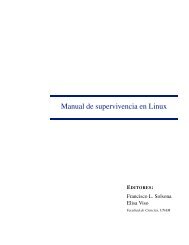PC Magazine - 2009 11.pdf - Libertad Zero
PC Magazine - 2009 11.pdf - Libertad Zero
PC Magazine - 2009 11.pdf - Libertad Zero
You also want an ePaper? Increase the reach of your titles
YUMPU automatically turns print PDFs into web optimized ePapers that Google loves.
Ironically, Korea’s protectionism has createdmore diversity than the U.S.’s iPod monoculture.Here’s where I go out on a limb. The iPodmonoculture in the U.S. did great things forthe digital music market, but it also lockedus into DRM for years. As we found outthrough the disaster of Microsoft’s Plays-ForSure, DRM doesn’t work well when thereare too many different companies involved.Without the iPod, music companies mayhave taken longer to enter the digital market,but they may have done so with lessDRM because no single solution couldaddress enough of the market.More TV?Koreans are crazy about mobile TV. DMB,their mobile digital TV system, seems tobe integrated into everything. This, in largepart, comes thanks to a proactive governmentthat set aside spectrum and defineda mobile TV standard long before ours did.But free mobile TV also provides an interestingsolution to the video DRM problem. Filmand TV companies are even crazier aboutDRM than music companies are, resultingin a chaos of different formats. Having onestandard for mobile TV let that form of videospread quickly, and perhaps there wouldhave been more pressure for a commonmobile TV standard here if Apple hadn’t sodominated the media conversation.Missing LinksCapacitive touch screens are marvelous, butI saw very few in Korea; most people seemedto be using styli on their touch-screendevices. (Before you comment, Korean isn’ta character-based language like Chinese,which requires you to draw characters witha stylus—it uses a 24-character alphabet.)The rage for capacitive touch screens in theU.S. has largely been driven by the successof the iPhone; manufacturers don’t seem toget why users love them.The big wild card, of course, is whetherApple’s iProducts have pushed all interfacesforward. Many modern smart device interfaces—especiallythe touch screen ones—owe a lot to Apple’s software design. Whatwould interfaces look like if Apple hadn’tbrought big icons and simple menus to thegame? Hopefully they wouldn’t look likeWindows Mobile 5, a mobile OS that is predicatedon finger-unfriendly screens that borrowway too much from desktop <strong>PC</strong>s.Apple and KT, a Korean wireless carrier,recently announced they were bringing theiPhone to Korea. So maybe the era of gadgetdiversity in Korea is coming to an end.But I don’t think so. Koreans are very patrioticabout their gadgets, and Samsung andLG are both innovative companies. I’m notsure if we can learn anything from Korea’srelative avoidance of all things Apple, butit’s still interesting to see a country wherethey really do think differently.STAY PHONE-SMART Keep up with the lateston smartphones by reading Sascha’s column atgo.pcmag.com/segan.NOVEMBER <strong>2009</strong> <strong>PC</strong> MAGAZINE DIGITAL EDITION 45







